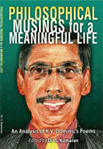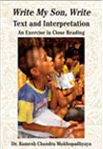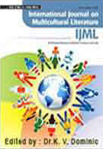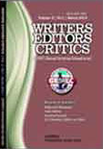Details of Critical study
Syed Ameeruddin’s Rainbow Rhapsodies: a String of Alluring Love Poems
Year Of Publish:
Syed Ameeruddin’s Rainbow Rhapsodies: a String of Alluring Love Poems
Review Article
Syed Ameeruddin’s Rainbow Rhapsodies: a String of Alluring Love Poems
K. V. Dominic
Prof. Syed Ameeruddin is a widely published, anthologized, translated and critically acclaimed contemporary Indian poet in English. Born in 1942 in Andhra Pradesh, India, Prof. Ameeruddin completed his Masters Degree in English Language and Literature from Aligarh Muslim University in 1966 and joined as Lecturer in English New College, Chennai in 1968 and retired as Head of the Department of English Post Graduate Research in the year 1995. He visited U.S. twice to attend the World Congress of poets in San Francisco (1981) and in Florida (1985) and was honoured at the Florida Congress as “Laurel Man of Letters.†He also visited Bangkok, Thailand, Istanbul, Turkey and Taipei, Republic of China to attend the World Congress of Poets and to chair sessions and read his poems. He also visited several American and U.K Universities on a lecture cum poetry reading tour. Ameeruddin was awarded the Michael Madhusudan Award for literature in 1988. He was also honoured with the Australia Day Award for literature at Melbourne for excellence in World Poetry by The Poetry Day Australia International, Australia in the year 1990. He was also awarded with the highest academic honour ‘Professor of Distinction’ by the Soka University, Tokyo, Japan. He is one of the contributors to the Routledge Encyclopedia of Commonwealth Literature, London. He has been elected Honorary Professor of Letters by the Temple of Arts Academy International, New York, USA. He is also the chairman to Board of Advisors and American Biographical Institute, North Carolina. He is the Founder and President of the world reputed literary organization, ‘International Poets Academy.’
Prof. Ameeruddin has published seven collections of poems namely What the Himalaya Said and Other Poems, The Dreadful Doom to Come and Other Poems, A Lover and a Wanderer, Petallic Love Times, Visioned Summits, Visions of Deliverance and Rainbow Rhapsodies. He has also published three reputed anthologies on world poetry namely Indian Verse in English, New Voices and Voices International.
I have been fortunate enough to bring out an edited book on him and four other contemporary Indian poets in English entitled Discourses on Five Indian Poets in English: Keki N. Daruwalla, Shiv K. Kumar, Pronab Kumar Majumder, Syed Ameeruddin & Aju Mukhopadhyay published by Authorspress, New Delhi in 2011. The book was reviewed in detail by The Hindu on 31 December 2011 in its Literary Review Supplement. There are nine critical articles on Syed Ameeruddin in that book, the highest number of the five poets.
Dr. D. C. Chambial a renowned poet, critic and editor of Poetcrit estimates Syed Ameeruddin’s greatness as a poet quoting from the reviews of newspapers:
National Herald (Delhi) claims that “His poetry can, at best be described as a conglomeration of the metaphysical, the surreal and existential.†And The Hindu holds that the poems in Visioned Summits are about “the search for ultimate meaning in life†and Deccan Herald (Bangalore) finds that “The divine light of bliss overwhelms him.â€Â The New Indian Express comments that “The poet, in a blissful state of spiritual enlightenment yearns for peace on earth.†(195-96)
Chambial reinstates that “His poetry is out and out philosophical and mystical which endeavours to unravel the mysteries of present and future in the form of manifest, non-manifest and beyond manifest-life† (202).
Another famous poet Prof. O. P. Mathur is of opinion that “Perhaps it is high time that Indian critics and literary historians also pay due attention to the upcoming crop of modern Indian English poets among whom Ameeruddin should receive proper recognition for the characteristic uniqueness of his poetry†(258).
P C K Prem, a reputed poet, novelist and critic has high esteem for Syed Ameeruddin. He has written:
It is an experience to go through the poems of Syed Ameeruddin. He is a well known name in the Indian English poetry and reading him, one feels unique thrills of an ennobling spirit pervading the entire mortal frame while a kind of distinctive catharsis takes place within without apparent feeling. He has an awe inspiring religious bent of mind that infuses each word with a soul filling nectar. He is surprisingly rooted in Indian culture and traditions, ethical values and eternal belief in the existence of God in each particle of animate and inanimate. Somewhere, a thought continues to tease the inner consciousness with the feeling that perfection is possible only if sincere efforts are made to live a life of meaning and substance. It is a stupendous poetic effort with an immense philosophical and religious import directed at mankind involved in transient acts that make life meaningless. In another context, it is a humble attempt to reconcile the imperfections of the worldly life with the excellence of divinity, divinity that cannot be explained but can only be experienced provided man has faith. One has to reach the mental areas of the poet in order to comprehend the hidden meanings which are shrouded in mystery in the play of words he uses laden with intensity of images and stunning metaphors. The poet’s play with the words is majestically unimaginable, for he unceasingly bowls between earthly realities and ethereal possibilities bordering on truth of life on earth. (260)
Another prominent poet Prof. R. K. Singh evaluates Syed Ameeruddin thus:
Syed Ameeruddin is rich in his expression of Indian spiritual influences, Indian myths, legends and culture, and the socio political condition prevailing in the country. The poet himself believes in expression of Indian rich tradition and culture.
Syed Ameeruddin writes with a social and moral purpose with a view to changing the fabric of the society where man recognizes man, religion recognizes religion, and people abide by the concept of oneness of humankind. His poetry supports values of humanity, peace, love and harmony, just as the poet insists on respect and preservation of nature and ecological balance. Â (275)
Rainbow Rhapsodies, the latest collection of Prof. Ameeruddin was published in 2014 by International Poets Academy, Chennnai. The book was edited by Dr. Krishna Srinivas, the reputed English poet long back before he died in 2007 and Prof. Ameeruddin has dedicated the book to him whom he calls lovingly as his Guru. Ameeruddin’s dedication words read thus: “Dedicated to the fond memory of my Guru – Padma Bhusan Dr. Krishna Srinivas, a world renowned poet, who is my fount of inspiration, in persuading me to collect all my love poems, published (so far), in various collections and journals all over the world – in a single volume. That’s the offering – “Rainbow Rhapsodies†a Bouquet of Love†(Ameeruddin 3). There are 47 well composed love poems presented in five phases of this book. The book opens with Dr. Krishna Srinivas’ foreword and ends with the section “world opinions†which carries comments on Syed Ameeruddin by renowned poets and critics of the world. To add beauty to the book each poem is adorned by meaningful pictures.
Krishna Srinivas has rightly assessed Ameeruddin in his foreword: “In the contemporary pernasian world Syed Ameeruddin has emerged as an unique phenomenon – for his poetic mission, spiritual vision, romantic surrealism, vibrating dynamism, symphonic symbolism, complex imagery and above all for his humanitarian and metaphysical concerns†(Ameeruddin 9). Sinivas judges Ameeruddin’s love poems thus: “. . . Ameeruddin’s poems are an ascension towards love. He attains through love the fullness of reality. Love yields him its greatest treasure. The act of love surges and resurges. He traces the erotic multi-facets of love and presents in every evocative way the process and evolution of love from the ideal and platonic to pragmatic and surrealistic trends of our time†(Ameeruddin 15).
Phase I is given the title “Sonorous Sojourns…†which contains 29 poems. The opening poem “Bells of Reminiscences†is an excellent love poem in which the lovers unite at a shore at dusk. The tempting beauty of the sunset is conducive for sensuous passion. After several years the lovers visit the shore again and with agonizing mind think and ruminate those golden moments:
The wheel moves on
He and she glued
to shades on shores—
mirroring each to each—
flames vortexing agonies
and reliving reminiscences
in kaleidoscopic corridors
of each other’s minds.
(Rainbow Rhapsodies 24)
“Love Strings†(26-28) is a wonderful poem full of fantastic imageries to create an atmosphere of love and passion. Some fine examples of imageries are: “fractured night,†“cryptic chills,†“bouquet of stars,†“silvered sands,†“cascaded heart,†“velvety longings,†“eternity captured,†“rosemary nectars,†“sipping symphonies,†“heart’s lyre,†“rippling smiles,†and “spectroscopic eyes.â€
“Come, Beloved†(30-32) is a spectacular love poem in which the lover invites his beloved to celebrate the best of their pure love. Look at the beauty of the following lines:
Come beloved!
Let us celebrate
The rainbows we crushed
In the whitish-vibrant blues,
Dreaming a morrow
Of buds and babes,
Of leaves and flowers
Of seeds and fruits,
Incasting and incarnating
Babbling lives
In streets and cities
Stones and tombs –
An eternal craze of a confluence,
A resurrection
Of bones and flesh;
A repetitive rehearsal
A wheeling mirage… (31-32)
“Dream Girl†as the title connotes is a fantasy love poem. The lover visits the shores often in the evenings and there he experiences an apparition in which he is taken by the beloved to the “far off isle in skies†and with her in “a frenzied race†create a universe “of raptured cheers / till dawnâ€; but tragically “at dawn / leaves me forlorn / and all alone.â€Â (34). The beauty of the poem is added by the mellifluous rhyming.
“On One Evening†(36) is a beautiful poem having the premises of ‘Kailasanatha’ temple as the background. Sitting together before the statues of Shiva and Parvathi the lovers experience the bliss of Shiva-Parvathi love:
Thus they experienced
The boundless bliss of reverie
In those magnificent moments
Of being… Shiva and Parvathi. (36)
“Shattered Dreams†(38) is a pensive poem of betrayed love. The suitor feels much distressed though he appears with a seeming smile. He is left alone.
Distances grow
Galloping inbetween…
The edifice of our dreams
Collapse and chaos sets in:Â (39)
He blames her for shattering their dreams. He understood only lately that she was very selfish and her love to him was not at all genuine.
All that you wanted
Was a tempting toy to play …
. . . . . . . . . . . . . . . . . . .
Your threw me out of your life
Like the crushed rosy petals
From the tainted nuptial bed …
. . . . . . . . . . . . . . . . . . . .
Unaware of your sweet scorpion stings,
In my inner spiritual kaleidoscope,
I always visualized you
As my parvathi, my radha, my sakuntala …
Only now, I realized,
All that was with you – is a mirage,
You are a bewitching,
Urvasi, rambha, menaka,
Entered into my life to ruin
My mental poise and spiritual integrity … (39-40)
References and allusions to the characters of the Hindu epics ennoble the poem and take the readers’ minds to multi layers of superb images and stories.
“Simmering Loneness†(42-46) is another throbbing love poem where the atmosphere is gloom and solitude. It also is a sad experience of betrayed love. The suitor’s pensive mood is reflected on the shores: “Then, I watched / The trembling moon / Mocking at my loneness.†(42) He then recollected the good old days with her on the shore and then how she departed him:
“Dear, forget, treat all that as sham,
a ritual to be forever,
a pretence, a self-deception,
away from realityâ€-and left… (45)
The disturbed sea becomes calm and “seems to snore†and he reconciles with the reality:
In that simmering silence
I realised…
Forever means a hazy horizon
A stupid sentimentality
Which leads nowhere
Except into the sadeyed silence
Which ends as cataclysmic despair… (45-46)
“You Are a Beautiful Poem†(82) is a sensuous love poem in which the suitor laying his head on the lap of his sweetheart sees her as beautiful poem. In her eyes he watches “fireflies light up / The future manuscripts of my poems.†(82) The poet ends the poem with the superb lines:
Lets love each other
To the depths and breadths and heights
Our souls can reach
To realize the ideal of
Sat – Chit – Ananda. (82)
In the section Phase II entitled “Purple Meanderings…†there are eight poems. “Love Times†(94-96) is highly sensuous poem full of imageries. The locale, as common to all the poems in the book, is the same shore and the time is night. As the azure sky unites with the sea, the suitor recollects how he united with his sweetheart. Look at the beauty of the sensuous lines:
A statue of Ajanta…Thus
I touched, smelt
all the secret wine waves
of your body
And swayed with them
in every movement
And listened to the orchestra
of sensual melody. (94-95)
“Sleeping Memories†(98-100) is another fine poem in which the suitor recollects his tender love times. His solitude is reflected in the moon:
Now I am alone and
found the moon a stone
Alone walking amidst
the shadow of ruins
Walking towards
a strange and savage destiny. (98)
Again we find excellent imagery in the following lines:
It is here on this golden sands we shared
the ragas of the wind
It is here the gypsy dark closes gently over
memories we recall –
It is here we shared our
love in lyric splendour.
This gypsy satchel carries all my
sepulchre symphonies –
This fatigued evening carries all my
distorted rainbow rage. (99)
The beauty of imagery in the phrases ‘golden sands,’ ‘ragas of the wind,’ ‘gypsy dark,’ ‘sepulchre symphonies,’ ‘fatigues evening’ and ‘distorted rainbow rage’ is remarkable.
“Love Song†is an enticing poem in which the suitor mentally invites his sweetheart to him who is resting on the shore. It is a long poem of eight stanzas each opening with the refrain “My love, come and wait for me.†There are so many beautiful images which create perfect love atmosphere and emotion. Look at the beauty of the lines:
Looking into your sparkle swirling eyes
With a touch of ebony
And with a shower of silver
Hovering around your prismatic body
I shall open the storm of the sea,
And wrapped in the tides of the moon
I shall bring you a poem
In a pulsating pearl
Which symphonies the saga
Of our many splendoured love. (102)
How many fantastic images!  The imagery in “a poem / In a pulsating pearl / Which symphonies the saga / Of our many splendoured love.†is really superb. The following lines of the same poem reminds Robert Frost’s poem “Stopping by Woods on a Snowy Evening.â€:
The sun that rises is bound to set,
Make haste, live life. Chide and challenge,
Like the restive tides dancing in trance
Uncared of the onslaught of simmering storm.
Let us seize the fleeting moments
Of the present in our firy and tipsy fists,
Uncared of this and that, now and then,
Here and after,
To make our vanishing moments purple and alive. (104-105)
Unlike Frost’s message to go ahead and think of the future rather than stay captivated on the transient beauty of the present, poet Ameeruddin antithetically presents lovers’ urge to spend the present moment maximum enjoying, least bothered about the future.
“My Beloved†is a highly sensuous and emotional poem in which the suitor’s mind is longing, weeping and searching for his sweetheart who has left him. He ruminates every occasion of their love times and how amorously they sat together showering love on each other physically, mentally and orally. The poem ends beautifully with the stanza:
Where are you, my beloved?
My sweetheart! My esteemed spirit!
Wherever you may be, I proclaim
Our true love to this Natures bounty-
Stormy seas, green pastures, starstudded skies,
Moonblushed shores, golden glades and
Whispering foliages,
All witnessed our petallic lovetimes
On their tender bosom, and nurtured
Our souls to the tunes of pure passion and
Rainbow melodies. (118)
“I am Alive Again†is a highly sensuous poem in which the lady-love sweetly remembers the bodily effect on her when the suitor amorously touched, kissed, caressed and embraced. His passionate acts made her alive again. Have a glimpse at the following lines:
Love strings are stirred in my inner being
The clear sky hangs blue
My hear is full and soul surged
And I am tender once again –
There is change to redeem myself
From the futile past and lousy present
Through passages to another world
Into a new destination. A golden glade:
I am alive again – (122)
Phase III of the book entitled “Pulsating Purplexes…†contains three long poems with the title “A Lover and a Wanderer†Part I, Part II and Part III. In Part I the suitor reflects how his sweetheart came into his life; how they met for the first time; how she conquered his heart and enjoyed sex in the night. At the dawn he bade her good bye:
Goodbye! Goodbye!
Carefree into the winding ways
Unbounded, I must walk
A head start for tomorrow
Leaving the reminiscence of past
Where I am, and tread
Forward in the exhilarating future,
A wild winding path. Journey is long,
I must wander, I must wander;
There is storm in my lone soul
And the whirly waves are calling. (142)
Part II speaks about their meeting again and involving in sex. He reflects that when night falls wherever he may be, her sweet whisper haunts him. He longs to meet her again and again as a stranger and thus experience the passion of love more strongly:
Therefore dear,
Let us meet as strangers,
And pretend, for a moment
You are mind and I ma yours,
In this wild torrent night
To resurrect and rejuvenate our love
With the brutal anonymity
Of grief and acquaintance,
Let us remake and rebuild
The moment of purple paradise
AVAILABLE WORLD WIDE





